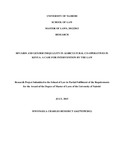| dc.description.abstract | This study considers the role of the law in mitigating the impact of HIV/AIDS in co-operatives in Kenya. Its main focus is on agricultural based co-operatives. HIV/AIDS is a leading cause of death in the world and is a global phenomenon traversing virtually all spheres of life. Its effects are not just medical. They have far reaching implications even in social and economic development. Co-operatives as self-actualisation measures aim at uplifting living standards of the co-operators but despite this important role they play, HIV/AID continue to weaken their ability to ensure effectual functioning. Consequently there is need to address HIV/AIDS on co-operatives, an endeavour of this study. It draws on experiences on how the law has been used in addressing this problem from Canada, a developed country with an entrenched and vibrant co-operative movement and South Africa, an African country with the most number of people living with HIV/AIDS. In so doing, it also considers the role and place of gender mainstreaming in halting and reversing the effects of HIV/AIDS from a multi-disciplinary viewpoint | en_US |

